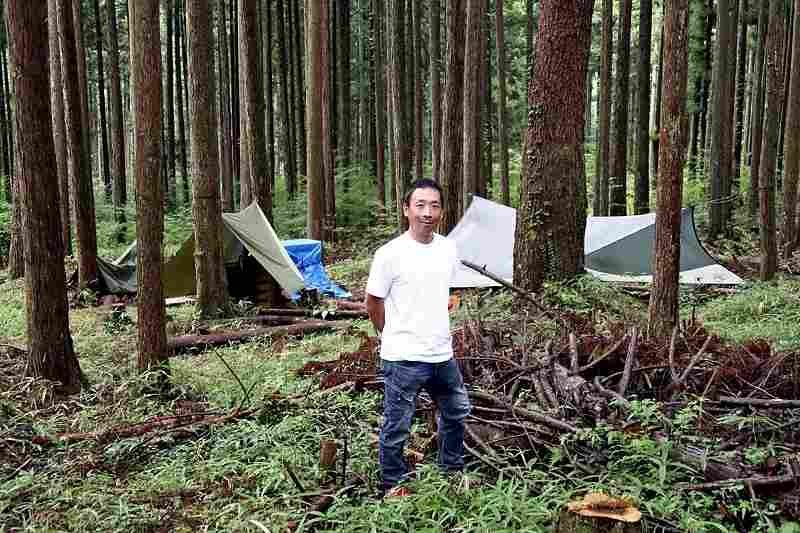Renting a forest space popular among city dwellers seeking nature time

Yamakyo President Fusakuni Taguchi who started a forest rental service for camping enthusiasts in Higashi-Shirakawa, Gifu Prefecture
20:00 JST, October 13, 2022
HIGASHI-SHIRAKAWA, Gifu — A service that began in the village of Higashi-Shirakawa, Gifu Prefecture, to rent out forest space on an annual basis is spreading across the country.
The service connects the needs of city dwellers who want to enjoy the mountains — which has resulted in a camping boom during the coronavirus pandemic — with the needs of local residents who do not want the mountains to be neglected. It is a business that has changed the conventional concept of forests as solely timber-producing areas.
In November 2020, Yamakyo, a forestry and lumber company based in Higashi-Shirakawa, started a service called “forenta” in which it leases portions of its forests.
President Fusakuni Taguchi, 45, first became aware of the potential of a forest rental business about six months prior. After seeing an entertainer on TV who bought a forest and was enjoying solo camping, he became convinced that forests could be a source of income for their space, not only as places to grow timber.
On the other hand, Taguchi was concerned about the future of forests that are purchased for outdoor activities, because after the boom is over, they may be left unattended.
He came up with an idea to rent out the company’s forests while retaining ownership and management responsibility.
As there was no precedent, Taguchi started by creating a system for the new service. The company-owned forests are divided into 17 plots of about 990 square meters each, and leased on an annual basis. The rental fee is ¥66,000 including tax. He thought it would be a fair comparison with campground fees.
The forest spaces are leased as they are, with no water or electricity, and the only initial investment was for pickets for zoning each plot and the installation of portable toilets. Users are allowed to cut down Japanese cypress and cedar trees in the plots if they are less than 15 centimeters in diameter.
When Taguchi invited applications for the service, as many as 440 people applied, mainly from Aichi Prefecture but also from far away places like Tokyo.
According to Taguchi, most were in the generation of “fathers who enjoy solo hobbies,” and the renewal rate for the second year reached 90%. The village government also asked Taguchi’s company to rent out the village-owned forests. Currently, there is a total of 77 plots available and there are no vacancies.
The service also brings great value to forest owners. The profit from logging Japanese cypress and cedar trees grown for 50 years in a one-hectare mountain forest is roughly the same as that earned from one hectare of the forenta service in a year.
Taguchi has also signed franchise agreements with forest owners in places including Takayama in Gifu Prefecture, Shizuoka Prefecture, Kyoto Prefecture and Hokkaido. He taught them the details of the service and has recruited people to lease their forests through the forenta website. The number of forenta plots outside the village has grown to about 70. “I want to have 10,000 plots nationwide,” he said.
Tomohiro Kimata, a senior consultant at Satoyume Co., who is well versed in the forest service industry, said: “The forenta service can coexist with the forestry industry because it does not need to develop mountains. Similar services have emerged, but I’d like to see these services move toward building new relationships in which users and local residents interact, rather than engaging in price competition among service providers.”
Reinvigorating villages

Participants enjoy being out in the forest with their dogs as part of a project called “Wanko-no-Mori Asobi” in Odai, Mie Prefecture.
With about two-thirds of its land covered by forest, Japan is rich in this resource. But domestic timber has long lost ground to imported timber, prices and demand have slumped, and forestry workers have decreased 70% in the past 35 years.
Trees are only becoming bigger and the volume of planted forests, which make up 40% of all forests nationwide, has increased about six times in about 50 years.
In seeking to reinvigorate the forestry industry and mountain villages, the central government has groped for ways to use forest spaces for areas other than forestry, such as health, tourism and education. In 2019, it named such efforts “the forest service industry,” and is working to develop the industry in close cooperation with local governments, companies and organizations.
In the Tokai region, the village of Shirakawa in Gifu Prefecture was selected as a national model area in this regard, and the city of Gujo in the same prefecture was chosen as a sub-model area in 2020. Gujo accepts corporate training programs that include forest and river experiences around the headwaters of the Nagara River. Gifu Prefecture is also preparing to establish a council to promote the forest service industry.
In Mie Prefecture, the “Wanko-no-Mori Asobi” program started in 2019 in a man-made forest owned by Toyota Motor Corp. in the town of Odai. This unique project, which was adopted by Toyota’s public offering, allows dogs and their owners to play together in the forests or in mountain streams.




